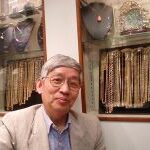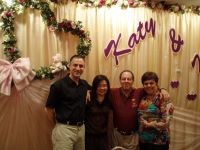Our Peak Experience
Everybody loves Hong Kong—and with good reason. One is the setting, unlike almost any city in the world, with its center on Victoria Harbor which separates Hong Kong Island from Kowloon on the mainland. This is the tourist hub, and the bright lights and shopping meccas that are a second reason that Hong Kong is a popular destination. That has been so since the 1840s, when, as a result of the Opium War—when the Chinese attempted to interdict (look that word up) the opium trade (from India, which is one connection for the course theme), the British sent in troops. In 1842, the Treaty of Nanking, ending the Opium War, started what the Chinese call the century of humiliation.
Out of that treaty, the Chinese ceded Hong Kong Island in perpetuity to the British; two decades later, another war, and another Chinese defeat ceded the Kowloon peninsula to the British. At the turn of the century, the foreign quest for spheres of influence led to the addition of the New Territories on a 99 year lease as part of the colony of Hong Kong. It was the end of that lease that prompted Sino-British negotiations that led in 1997 to the return of all of Hong Kong to the Chinese.
We arrived in Hong Kong Thursday around noon, and had much of the afternoon to explore or shop (shopping and eating are the favorite pastimes of most tourists here, and most Hong Kongers, now that I think of it). Some  of the students, though, reacted to being up for 36 hours by exploring the sleeping arrangements at our hotel. For me and Ruth Ann, it was a visit to a tailor we’ve used for years, and it’s always fun to visit him (and come away with some apparel that fits!).
of the students, though, reacted to being up for 36 hours by exploring the sleeping arrangements at our hotel. For me and Ruth Ann, it was a visit to a tailor we’ve used for years, and it’s always fun to visit him (and come away with some apparel that fits!).
In the evening, my friend Eleanor—whom I met years ago in Viet Nam, and who has been a good friend to me and to IWU students over time—took us to a restaurant for a meal she had ordered. I told the students we’d probably be taken to a building, go up an elevator, and be in a restaurant where everyone would turn to look at us (because we’d be the only foreigners), and none of the help would speak English (or, because this is Hong Kong, a special administrative region of China, under British common law—not the mainland—not Mandarin, either; they speak Cantonese, a tongue in which I know 2 words—bok choi, a green vegetable, and joe tsang, which is good morning). What I did not reckon with was that this year, she took us to a wedding hall, where, for a while, we were the only people present. The meal was as different as could be from Indian, but every bit as sumptuous as our farewell dinner in Bangalore. We sat around a huge table with a lazy susan, with dish after dish passing in review. Professor Eleanor Cheaung (a management professor at the City University) knows of my fondness for Peking Duck, so that was included, but it was one of about 10 different dishes she had ordered. I have good memories 24 hours later—though some were off put by the chicken head that was on the plate with the chicken—as I said, that’s how you know it is what it is, and is genuine. At least they did not bring it live, like they do when you order snake! Food, as I’m reminded, is incredibly cultural. I think I was the only one of our group who had dim sum (egg rolls and dumplings) and congee for breakfast, but our hotel also offered omelets, waffles, cereal, fruit—and, since it was a British colony, roast tomatoes and baked beans.
morning). What I did not reckon with was that this year, she took us to a wedding hall, where, for a while, we were the only people present. The meal was as different as could be from Indian, but every bit as sumptuous as our farewell dinner in Bangalore. We sat around a huge table with a lazy susan, with dish after dish passing in review. Professor Eleanor Cheaung (a management professor at the City University) knows of my fondness for Peking Duck, so that was included, but it was one of about 10 different dishes she had ordered. I have good memories 24 hours later—though some were off put by the chicken head that was on the plate with the chicken—as I said, that’s how you know it is what it is, and is genuine. At least they did not bring it live, like they do when you order snake! Food, as I’m reminded, is incredibly cultural. I think I was the only one of our group who had dim sum (egg rolls and dumplings) and congee for breakfast, but our hotel also offered omelets, waffles, cereal, fruit—and, since it was a British colony, roast tomatoes and baked beans.
 This morning we took a tour of the city, which meant crossing from Kowloon to Hong Kong side, where we circled past Ocean Park (a pre-Disney rival to Disney), viewing some of the mansions (90% of the population at least live in high rises, about half of them in public housing); land is very expensive in Hong Kong. Our guide told us that free education is provided only through second year of high school, which is kind of surprising given that Hong Kong has a highly-educated population.
This morning we took a tour of the city, which meant crossing from Kowloon to Hong Kong side, where we circled past Ocean Park (a pre-Disney rival to Disney), viewing some of the mansions (90% of the population at least live in high rises, about half of them in public housing); land is very expensive in Hong Kong. Our guide told us that free education is provided only through second year of high school, which is kind of surprising given that Hong Kong has a highly-educated population.
On the perimeter of the island, we saw beaches, a few spectacular mansions (if you’re the right age—mine—you may remember “Soldier of Fortune”, a very bad Clark Gable movie, whose saving grace is a mansion we passed and Susan Hayward as Mrs. Hoyt),and Wan Chai, home of the world of Suzy Wong (Hong Kong was pretty sleepy until the “fall of China,” which brought it many Chinese refugees, including Li Ka-shing, who is frequently listed as the world’s richest man, and then the Korean War, which brought a lot of US sailors and foreign aid). It was also China’s trading port to the world, a distinction it is losing for central China to Shanghai, and to an extent for the South to Guangzhou.
I remember when I first came here 20 some years ago, there were still factories in Hong Kong, but today they’ve moved to South China, though many managers still live here. Ironically, with the handover and the ease of cross-border movement, some managers of Hong Kong companies now live on the mainland and commute the hour to Hong Kong because the cost of living is so much less. We wound up at the Stanley Market, which like Hong Kong has transformed from a ramshackle collection of interesting shops, many dealing in Western brands to more of a mall, as Hong Kong has transformed from manufacturing to services (much like Bloomington-Normal, though that took close to a century).
There’s a palpable energy here that is quite distinctive, and a cosmopolitan lifestyle that involves, as I said, shopping and eating for tourists and locals, and hard work, mostly in services, for the 7 million locals. There is a lot to do here, 24/7. Tonight, for example, Ruth Ann and I had a Korean meal (I love bibimbap), and then I went to the Hong Kong Philharmonic where the centerpiece was a Max Bruch concerto. I came back via the Star Ferry (which is free to senior citizens) and the metro (half price to those of us older and wiser), a rather nice evening for me. Our students were sampling the nightlife in Hong Kong—sipping it, I should hope, since we have an early morning ferry ride to Macau, which was the last European possession in Asia.